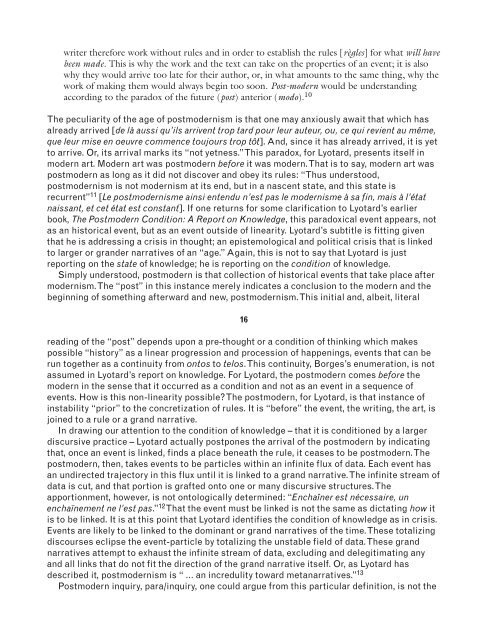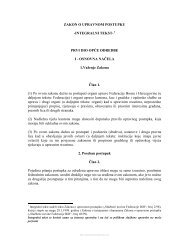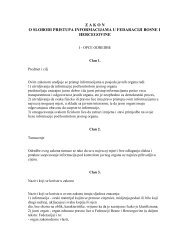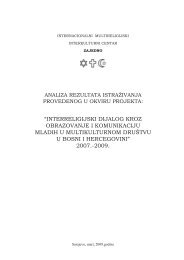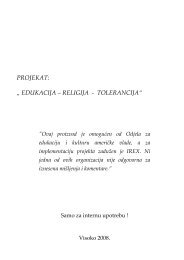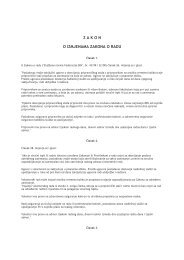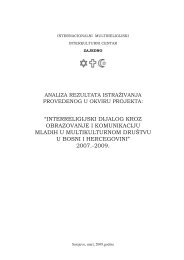ecognition of, if not hope for, the possibility of its restoration <strong>and</strong>, perhaps, redemption afterits fall(s) from God <strong>and</strong> into language. This particular rendering of the sacred is religious <strong>and</strong>transcendent in place, time, <strong>and</strong> form. 7 It is the sacred of a religious world, of the modernistpoet <strong>and</strong> artist. It is the sacred for which T.S. Eliot yearns near the end of The Waste L<strong>and</strong>:Ganga was sunken, <strong>and</strong> the limp leavesWaited for rain, while the black cloudsGathered far distant, over Himavant.The jungle crouched, humped in silence.Then spoke the thunderDa 8Without a transcendent sacred, or a transcendent law, or a completed sentence, as in Kafka,one is left asking if there is redemption in literature, as antiphilosophy. Is humanity, in effect,lost, without the redemptive promise of literature (sacrality) in the age of postmodernism? Isthere no restoration? No salvation? No fall(s) to reclaim? The sacred in the age ofpostmodernism includes all that modernism recognized, with an important difference: Thesacred, with its archaic foundation, its promise, its secret, cannot be restored to its formergr<strong>and</strong>eur; it must be substituted for, <strong>and</strong> that substitution is always non-transcendent,inadequate, infinite, <strong>and</strong> necessary. The question that remains is: How does one account forthis emergence of a radical difference within the sacred? This question brings us topostmodernism.ARRIVING AT THE POSTMODERN CENTERS15Immanuel Kant’s Aufklärung merely anticipates the uniformity of Enlightenment, just as theage of postmodernism anticipates the heterogeneity of the postmodern: “If we are asked, ‘Dowe now live in an enlightened age?’ the answer is, ‘No, but we do live in the age ofenlightenment.’ ” 9 In other words, a postmodern sensibility, like Enlightenment in Kant’s time,has yet to arrive. Defining postmodernism is similar to w<strong>and</strong>ering Borges’s labyrinthinelibrary. One can argue that postmodernism has yet to occur. In this sense, the age ofpostmodernism is an age of waiting <strong>and</strong> an age of anxiety. This, in part, is due to the conditionof the postmodern; it is an anxious condition because it is not entirely clear why or for whatone waits. Jean-François Lyotard introduces the postmodern in The <strong>Postmodern</strong> Explained asparadoxical event in time:The postmodern would be that which in the modern invokes the unpresentable in presentationitself, that which refuses the consolation of correct forms, refuses the consensus of taste permittinga common experience of nostalgia for the impossible, <strong>and</strong> inquires into new presentations– not to take pleasure in them, but to better produce the feeling there is something unpresentable[mais pour mieux faire sentir qu’il y a de l’imprésentable]. The postmodern artist orwriter is in the position of a philosopher: the text he writes or the work he creates is not in principlegoverned by preestablished rules <strong>and</strong> cannot be judged according to a determinantjudgment [d’un jugement déterminant], by the application of given categories to this text orwork. Such rules <strong>and</strong> categories are what the work <strong>and</strong> text is investigating. The artist <strong>and</strong> the
writer therefore work without rules <strong>and</strong> in order to establish the rules [règles] for what will havebeen made. This is why the work <strong>and</strong> the text can take on the properties of an event; it is alsowhy they would arrive too late for their author, or, in what amounts to the same thing, why thework of making them would always begin too soon. Post-modern would be underst<strong>and</strong>ingaccording to the paradox of the future (post) anterior (modo). 10The peculiarity of the age of postmodernism is that one may anxiously await that which hasalready arrived [de là aussi qu’ils arrivent trop tard pour leur auteur, ou, ce qui revient au même,que leur mise en oeuvre commence toujours trop tôt]. And, since it has already arrived, it is yetto arrive. Or, its arrival marks its “not yetness.” This paradox, for Lyotard, presents itself inmodern art. Modern art was postmodern before it was modern. That is to say, modern art waspostmodern as long as it did not discover <strong>and</strong> obey its rules: “Thus understood,postmodernism is not modernism at its end, but in a nascent state, <strong>and</strong> this state isrecurrent” 11 [Le postmodernisme ainsi entendu n’est pas le modernisme à sa fin, mais à l’étatnaissant, et cet état est constant]. If one returns for some clarification to Lyotard’s earlierbook, The <strong>Postmodern</strong> Condition: A Report on Knowledge, this paradoxical event appears, notas an historical event, but as an event outside of linearity. Lyotard’s subtitle is fitting giventhat he is addressing a crisis in thought; an epistemological <strong>and</strong> political crisis that is linkedto larger or gr<strong>and</strong>er narratives of an “age.” Again, this is not to say that Lyotard is justreporting on the state of knowledge; he is reporting on the condition of knowledge.Simply understood, postmodern is that collection of historical events that take place aftermodernism. The “post” in this instance merely indicates a conclusion to the modern <strong>and</strong> thebeginning of something afterward <strong>and</strong> new, postmodernism. This initial <strong>and</strong>, albeit, literal16reading of the “post” depends upon a pre-thought or a condition of thinking which makespossible “history” as a linear progression <strong>and</strong> procession of happenings, events that can berun together as a continuity from ontos to telos. This continuity, Borges’s enumeration, is notassumed in Lyotard’s report on knowledge. For Lyotard, the postmodern comes before themodern in the sense that it occurred as a condition <strong>and</strong> not as an event in a sequence ofevents. How is this non-linearity possible? The postmodern, for Lyotard, is that instance ofinstability “prior” to the concretization of rules. It is “before” the event, the writing, the art, isjoined to a rule or a gr<strong>and</strong> narrative.In drawing our attention to the condition of knowledge – that it is conditioned by a largerdiscursive practice – Lyotard actually postpones the arrival of the postmodern by indicatingthat, once an event is linked, finds a place beneath the rule, it ceases to be postmodern. Thepostmodern, then, takes events to be particles within an infinite flux of data. Each event hasan undirected trajectory in this flux until it is linked to a gr<strong>and</strong> narrative. The infinite stream ofdata is cut, <strong>and</strong> that portion is grafted onto one or many discursive structures. Theapportionment, however, is not ontologically determined: “Enchaîner est nécessaire, unenchaïnement ne l’est pas.” 12 That the event must be linked is not the same as dictating how itis to be linked. It is at this point that Lyotard identifies the condition of knowledge as in crisis.Events are likely to be linked to the dominant or gr<strong>and</strong> narratives of the time. These totalizingdiscourses eclipse the event-particle by totalizing the unstable field of data. These gr<strong>and</strong>narratives attempt to exhaust the infinite stream of data, excluding <strong>and</strong> delegitimating any<strong>and</strong> all links that do not fit the direction of the gr<strong>and</strong> narrative itself. Or, as Lyotard hasdescribed it, postmodernism is “ … an incredulity toward metanarratives.” 13<strong>Postmodern</strong> inquiry, para/inquiry, one could argue from this particular definition, is not the
- Page 2: PARA/INQUIRY“For those of us who
- Page 5 and 6: First published 2000by Routledge11
- Page 8 and 9: CONTENTSList of figures ixAcknowled
- Page 10: FIGURES3.1 Questioner of the Sphinx
- Page 14: Posting
- Page 17 and 18: meaning that founds philosophical i
- Page 20: CHAPTER 1Paralogies
- Page 23 and 24: Lyotard’s enjeu, Deleuze and Guat
- Page 25 and 26: In his book Pararealities: The Natu
- Page 27: acquittal. The horror of the text i
- Page 32: CHAPTER 2Parastructures of the sacr
- Page 35 and 36: In this critical space opened by Ni
- Page 37 and 38: Joyce’s Finnegans Wake the exempl
- Page 39 and 40: Deservedly confin’d into this roc
- Page 41 and 42: story of the sacred? Is there but o
- Page 44 and 45: The aspects of things that are most
- Page 46 and 47: AUTHENTICITYThe Sphinx has symboliz
- Page 48 and 49: The fact that I exist and have an i
- Page 50 and 51: connection with the Columbian Expos
- Page 52 and 53: through the sacred, so does the com
- Page 54 and 55: appropriation of his thought and of
- Page 56 and 57: use or civil meaning of the word (t
- Page 58 and 59: does not mean that one is sidestepp
- Page 60: of the twentieth century. As Lyotar
- Page 64 and 65: The sacred of the archaic world was
- Page 66 and 67: possibility for an expression of ex
- Page 68 and 69: the actual frame of the panels, the
- Page 70 and 71: space of the painting, and, second,
- Page 72 and 73: much a part of scholarship today. A
- Page 74 and 75: not merely interesting footnotes to
- Page 76 and 77: many to see Eliade as a mystic who
- Page 78 and 79:
phenomenology. Eliade’s arrival i
- Page 80 and 81:
of the sacred as a child in Romania
- Page 82 and 83:
discursive structure to relinquish
- Page 84 and 85:
autonomy of the work of art. But ha
- Page 86:
CHAPTER 5Para Shoah
- Page 89 and 90:
Faurisson reveals that the Shoah is
- Page 91 and 92:
MEMORIES OF FORGETTINGCertainty is
- Page 93 and 94:
political. Each of these ground(ing
- Page 95 and 96:
totalizing discourses or a determin
- Page 97 and 98:
Kantian wound often move toward a q
- Page 99 and 100:
Secret fauna and flora which the re
- Page 102:
CHAPTER 6Parasacred ground(ing)s
- Page 105 and 106:
often exist outside (the pagus) the
- Page 107 and 108:
graveyard. The sacred disfigures,be
- Page 109 and 110:
death, which is another repetition
- Page 111 and 112:
able to choose from a range of poss
- Page 113 and 114:
eligious. Mary’s presence as a mi
- Page 115 and 116:
As one walks through a cemetery, ti
- Page 117 and 118:
104Figure 6.15b Clinging to the Cro
- Page 120 and 121:
To think not is to linger with a ne
- Page 122 and 123:
PARASACRED IMAGESNor does one need
- Page 124 and 125:
irreverent piety in so far as eachr
- Page 126:
CHAPTER 8EpilogueParaultimacy
- Page 129 and 130:
The steps, the corridor, to the plo
- Page 131 and 132:
GLOSSARYI should say that in so far
- Page 133 and 134:
The early writings of the French ph
- Page 135 and 136:
NOTESPOSTING1 Michel Montaigne, Apo
- Page 137 and 138:
metaphysical notion of effectivespa
- Page 139 and 140:
and probably goes back to helios.Ea
- Page 141 and 142:
“compensate” the rigidity of th
- Page 143 and 144:
GLOSSARY1 Peter A. Angeles writes(H
- Page 145 and 146:
Stanford: Stanford University Press
- Page 147 and 148:
Riverside Shakespeare edn, Boston:H
- Page 149 and 150:
Carroll, Lewis 23cemeteries 93, 101
- Page 151 and 152:
painting 58; laughter as epiphany 5
- Page 153 and 154:
“paraexperience” 83, 86; the po
- Page 155 and 156:
postmodernism: authenticity 33;ceme
- Page 157 and 158:
Thousand Plateaus, A (Gilles Deleuz


